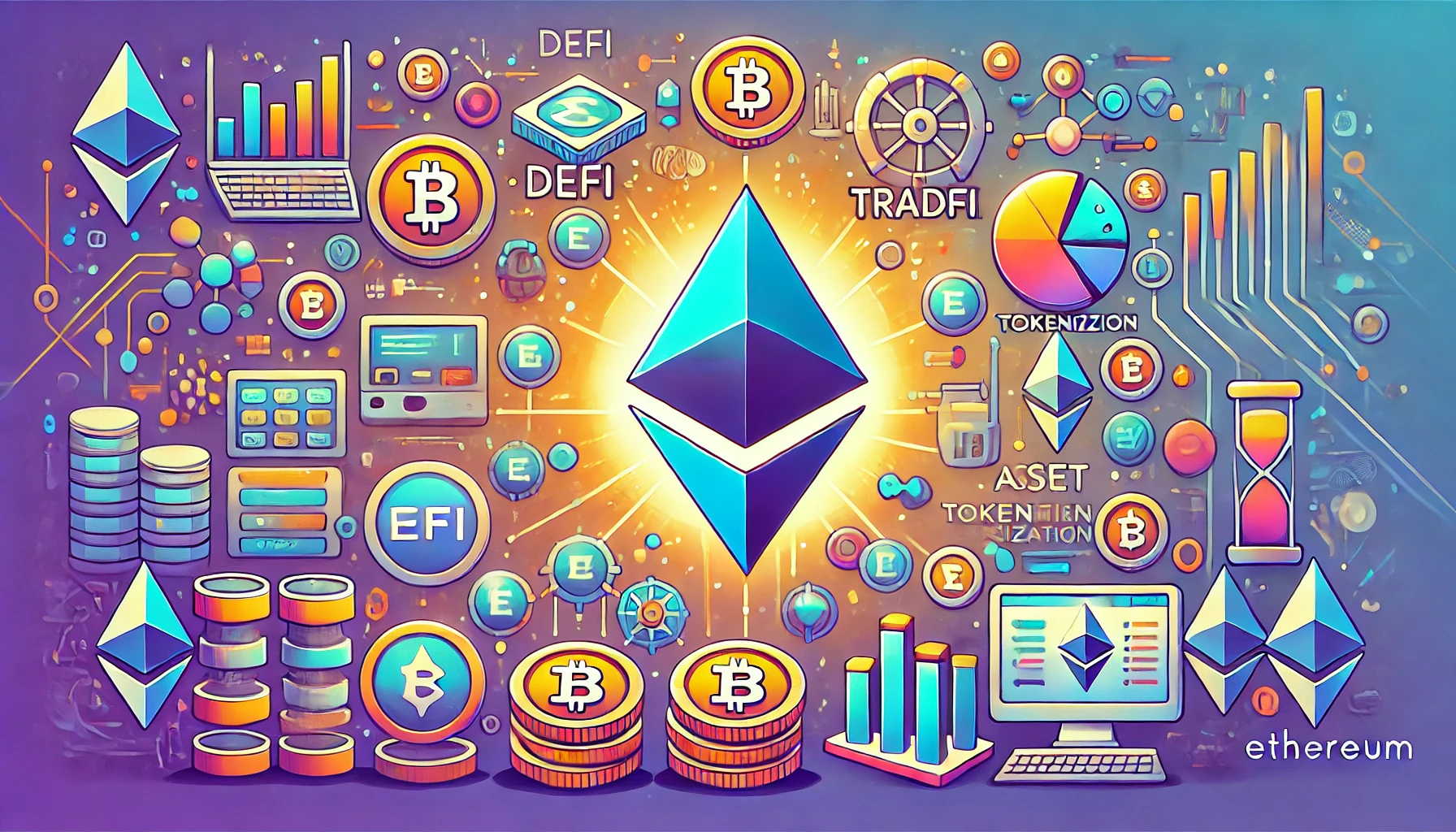Can you imagine a world where you can combine the best of traditional finance with the innovation of decentralized finance?
Imagine assets being more accessible, transactions being faster and investment opportunities being available to everyone.
This convergence is already a reality thanks to asset tokenization.
In this article, you will discover how decentralized finance (DeFi) and traditional finance (TradFi) are merging to create a new financial ecosystem.
Introduction to Decentralized Finance
What is Decentralized Finance (DeFi)?
Decentralized finance, commonly known as DeFi, is a financial ecosystem based on blockchain technology that enables financial transactions without traditional intermediaries such as banks or brokers.
They use smart contracts to execute transactions automatically and securely.
How Does Decentralized Finance Work?
DeFi platforms operate on blockchain networks, such as Ethereum, using smart contracts that automatically execute transactions when certain conditions are met.
This eliminates the need for intermediaries, reducing costs and increasing efficiency.
Advantages of Decentralized Finance
– Accessibility: Anyone with Internet access can participate.
– Transparency: Transactions are visible on the blockchain.
– Efficiency: Transactions are fast and automatic.
– Reduced Costs: Lower rates by eliminating intermediaries.
The Convergence of DeFi and TradFi
What is Traditional Finance (TradFi)?
Traditional finance refers to the conventional financial system that includes banks, stock markets, investment funds and other financial intermediaries.
This system has been the backbone of the global economy for centuries.
Benefits and Challenges of Traditional Finance
– Stability and Regulation: They provide safety and are well regulated.
– Trust and Reliability: Financial institutions have a long history of trust.
– Challenges: High costs, slow transactions and limited access.
The Merger of DeFi and TradFi through Tokenization
Asset tokenization is enabling the merger of DeFi and TradFi.
Tokenizing an asset means converting its value into a digital token that can be traded on a blockchain.
This offers the best of both worlds: the stability and trust of TradFi and the efficiency and accessibility of DeFi.
Asset Tokenization: The Bridge between DeFi and TradFi
What is Asset Tokenization?
Asset tokenization is the process of issuing a digital token on a blockchain that represents a real asset.
These assets can include real estate, artwork, stocks, bonds and more.
Advantages of Asset Tokenization
– Increased liquidity: Tokenized assets can be fractioned, facilitating their purchase and sale.
– Global Access: Anyone in the world can invest in tokenized assets.
– Transparency: Transactions are recorded on the blockchain, increasing transparency.
– Efficiency: Transactions are fast and low cost.
Investment Opportunities in Tokenized Assets
Asset tokenization opens up new investment opportunities, allowing investors to access asset classes that were previously out of reach.
This democratizes investment and allows for broader portfolio diversification.
Success Story: Oceanpoint
Oceanpoint is a successful project that has used tokenization to transform the real estate market.
They have created an open DAO (Decentralized Autonomous Organization) designed to own an unlimited pool of real estate assets.
Anyone can participate without legal restrictions and earn by contributing to a DeFi protocol backed by the real estate economy.
Oceanpoint features:
– Asset Pools: Allow to earn BST tokens by participating in the tokenization of real estate properties.
– Liquidity Pools: Provide liquidity in AMM protocols such as Uniswap, increasing BST holdings.
– Governance: Participants have governance rights over the protocol, allowing community decisions on the development of the ecosystem.
Global Impact:
– Total Tokenized Value: $100 million in real estate assets.
– Average APY: 7.25% generated by these assets.
– Individual Properties: 104 tokenized properties in 21 different countries.
For more details, you can visit their official website.
The Future of Decentralized Finance and Asset Tokenization
Technological Innovations
Blockchain technology and smart contracts will continue to evolve, improving the efficiency and security of DeFi transactions and asset tokenization.
Regulation and Standards
As the adoption of DeFi and tokenization grows, it is crucial that regulators develop legal frameworks that protect investors and promote innovation.
Interoperability between platforms
For DeFi and TradFi to work together effectively, it is essential that the platforms are interoperable, enabling seamless integration of decentralized and traditional financial services.
Getting Started in DeFi and Asset Tokenization
Initial Steps for Investors
- Education: Learn about DeFi and asset tokenization.
- Trusted Platforms: Choose reliable and well-established platforms.
- Diversification: Diversify your investments to minimize risks.
- Security: Use secure digital wallets and protect your private keys.
Risks and Considerations
– Volatility: DeFi markets can be volatile.
– Regulation: Regulation is still evolving.
– Security: Platform security and protection against hacking is crucial.
Conclusion
The intersection of decentralized and traditional finance through asset tokenization is revolutionizing the financial world.
This convergence not only offers greater investment opportunities and efficiency, but also democratizes access to previously exclusive markets.
With successful examples like Oceanpoint, it is clear that the future of finance is bright and accessible to all.
If you are looking to explore new opportunities in the investment world, asset tokenization and DeFi are promising areas worth considering.
Tokeniza Real Estate uses the Oceanpoint protocol as a liquidity pool for our tokenizations, along with the economics of the BST utility token for the future DAO of our marketplace.
If you want to learn more and earn BST, join the Blocksquare Regional Hub Spain.

